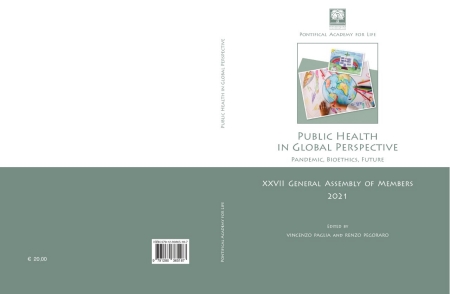The Proceedings of the 2021 Assembly have been published

“On the one hand we are worn out by the Covid-19 pandemic and by the inflation of issues that have been raised… However, on the other hand, it is essential to reflect calmly in order to examine in depth what has happened and to glimpse the path towards a better future for all.” These words from the Holy Father, which preface Public Health in Global Perspectives, a new title from the Pontifical Academy for Life, capture the essence of a global and Catholic perspective on the pandemic. Though lockdowns, virtual school, and telework have exacted a toll, the faithful can and must extract the valuable lessons derived from their experience to serve the common good in the future.
Public Health in Global Perspectives is composed to facilitate such an analysis. This publication covers the proceedings of the Academy’s 2021 General Assembly of Members and is mostly comprised of a strikingly broad range of speeches delivered over three days by experts from around the world. Topics range from immunology to epidemiology, from public health practices to theological analyses; Dr. Jules A. Hoffmann offered insights gained from his research on immune responses in fruit flies, while Maria Clara Bingemer interpreted social responsibilities in light of Genesis 4. Yet despite their variety, each speech addressed the weaknesses that the pandemic revealed in global health systems and in the fabric of society itself. Speakers gave special attention to Africa, South and Central America, and other underserved regions and populations that were overlooked in the West during the pandemic.
Rather than presenting a specific set of solutions to the problems presented, or proposing a cohesive theology of the pandemic, the book’s collection of speeches simply presents a variety of perspectives from informed individuals. These perspectives act as a spur to more complex, focused analysis on the individual level. Authoritative prescriptions for decision-making are left to other times and places. As the introduction states, the book is “an opportunity to reflect” on public health issues as Catholics.
Thus, many truly impactful theological conclusions from the Assembly may be off-limits to those who do not spend their time engaged in careful, qualified philosophical reflection. Likewise, the need for action created by the described deficiencies in our healthcare systems that speakers discussed – and the far-reaching solutions that some proposed – remains in the purview of the same experts (bound, of course, by the truths of theology).
Nonetheless, we may all still take away something useful from a reading of Public Health. For one, the perspectives of those like Dr. John Nkengasong, now-former Director of the Africa Centers for Disease Control and Prevention, help us to step outside our own experience of the pandemic and view it from a global vantage point. Especially in the United States and other developed countries, much reflection on the pandemic focuses on the inconveniences and controversies of the experience, such as virtual learning or mandatory vaccination of low-risk populations. While the truly human impact of social isolation and government policy should not be neglected by any means, the global perspectives provided by speakers like Dr. Nkengasong remind us of the exceptional hardships borne by those in less privileged countries, and the indifference they faced from many governments around the world. For young Catholic readers like myself, this should be a reminder of both the great generosity God has shown toward us, as well as our continual duty to serve the needy. As Christ reminds us, “much will be required of the person entrusted with much.”
Other speakers, like Professor Henk ten Have and Professor David Tillman, focus on a variety of needs precipitated by the pandemic, highlighting specific deficiencies from the formulation of bioethical frameworks to the impact of crop-intensive diets. And while the speakers have a penchant for counseling broad action – global forums, reinvented ethical guidelines, unified global administration of health crises, and even universal health coverage – non-expert readers might still benefit from considering these issues. We can ponder, in light of the principle of subsidiarity, what impact we can make in our own local communities and in our own families, to serve Christ by serving His least brothers and sisters. And, going beyond the topics addressed by most speakers, we must not forget the immense and unfailing power of prayer and God’s merciful providence to work miracles. After all, it is with God, not on our own, that we will find the most fruitful and fair solutions to the problems that plague us.
Public Health in Global Perspective presents an original dialogue among healthcare leaders, researchers, and theologians in the Academy regarding modern healthcare and how, considering the lessons of the Covid-19 pandemic, we might fashion new systems to best serve all of humanity. The book will be of interest to experts formulating a moral and ethical response to global health needs, theologians seeking perspectives proximate to Catholic theology on the common good in public health, and anyone looking to learn about and learn from Catholic dialogue on public health in the modern, global, post-pandemic world.
by Jack MANNING - University of Notre Dame (US)



